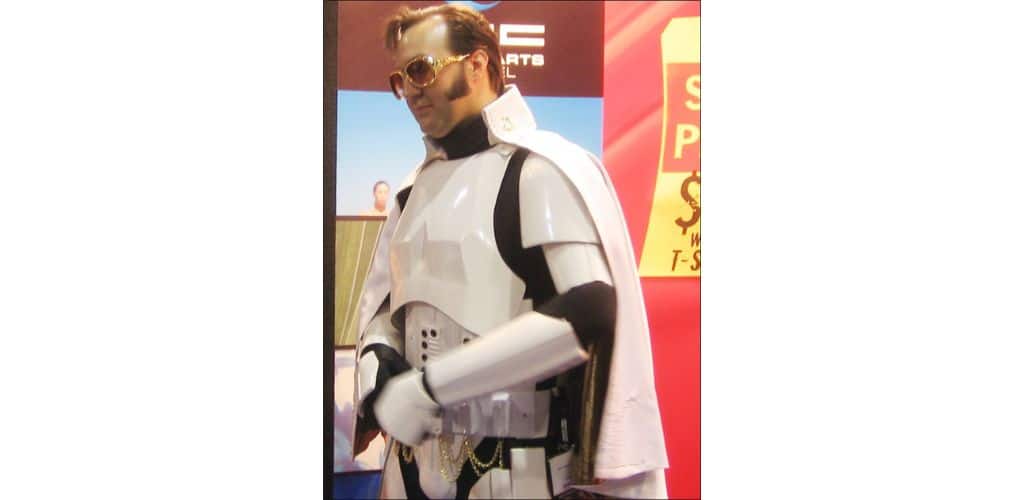The state of Tennessee has passed a law against the use of artificial intelligence (AI) to copy a person’s voice.
The law, signed on March 21, is called the Ensuring Likeness, Voice and Image Security (ELVIS) Act.
The ELVIS Act amends the state’s prior right of publicity law, which was known as the “Tennessee Personal Rights Protection Act” and dates from 1984.
Previously, the law only protected a person’s name, image, and likeness. The new Act adds protection for a person’s voice as well.
Under the new Act,
“Voice” means a sound in a medium that is readily identifiable and attributable to a particular individual, regardless of whether the sound contains the actual voice or a simulation of the voice of the individual…
(Emphasis added.)
The previous version of the law was also aimed, in part, at protecting the musical legacy of Elvis Presley, who lived in Memphis, Tennessee and had an estate called Graceland there that’s still a very popular public attraction.
Tennessee is also the home of Nashville, known for its country music industry.
The Act notes that “Every individual has a property right in the use of that individual’s name, photograph, voice, or likeness in any medium in any manner.”
The new version of the law prohibits any unauthorized “commercial use” of a person’s personal rights. The previous version only prohibited uses “in advertising.”
This property right can be passed down to a person’s heirs and also enforced by a music label that has signed a musical artist.
Under the Act,
Any person who knowingly uses or infringes upon the use of an individual’s name, photograph, voice, or likeness in any medium, in any manner directed to any person other than such individual, for purposes of advertising products, merchandise, goods, or services, or for purposes of fundraising, solicitation of donations, purchases of products, merchandise, goods, or services, without such individual’s prior consent, or, in the case of a minor, the prior consent of such minor’s parent or legal guardian, or in the case of a deceased individual, the consent of the executor or administrator, heirs, or devisees of such deceased individual, is liable to a civil action.
Interestingly, the Act also creates a cause of action if someone creates a tool (such as an AI engine) for violating the Act:
A person is liable to a civil action if the person distributes, transmits, or otherwise makes available an algorithm, software, tool, or other technology, service, or device, the primary purpose or function of such algorithm, software, tool, or other technology, service, or device is the production of a particular, identifiable individual’s photograph, voice, or likeness, with knowledge that distributing, transmitting, or otherwise making available the photograph, voice, or likeness was not authorized by the individual … or in the case of a deceased individual, the executor or administrator, heirs, or devisees of such deceased individual.
[Emphasis added.]
The language noted in bold suggests that generative AI tools of general applicability, not targeting specific individuals (such as Elvis) would not be prohibited.
AI technology has made it possible to create “voice clones” of artists that could reduce the value of a musical artist’s talents.
For example, as the New York Times reported, AI was used to create and “perform” a song called “Heart on My Sleeve,” that mimicked the work Drake and the Weeknd, “two of the most popular musicians on the planet.”
The Times quoted Martin Clancy, a musician and the chair of a global committee that seeks to explore the ethics of A.I. in the arts, who said,
What’s at stake are things we take for granted: listening to music made by humans, people doing that as a livelihood and it being recognized as a special skill.
The Act would seem to cause problems for human Elvis impersonators. However, the Act allows use of a person’s voice and image “For purposes of comment, criticism, scholarship, satire, or parody….”
The Act, believed to be the first of its kind, takes effect on July 1, 2024.
In addition to being addressed via tort actions, a violation of the ELVIS Act can also be punished as Class A misdemeanor, with penalties of up to 11 months, 29 days in jail and/or fines up to $2,500.
Just like the haiku above, we like to keep our posts short and sweet. Hopefully, you found this bite-sized information helpful. If you would like more information, please do not hesitate to contact us here.


